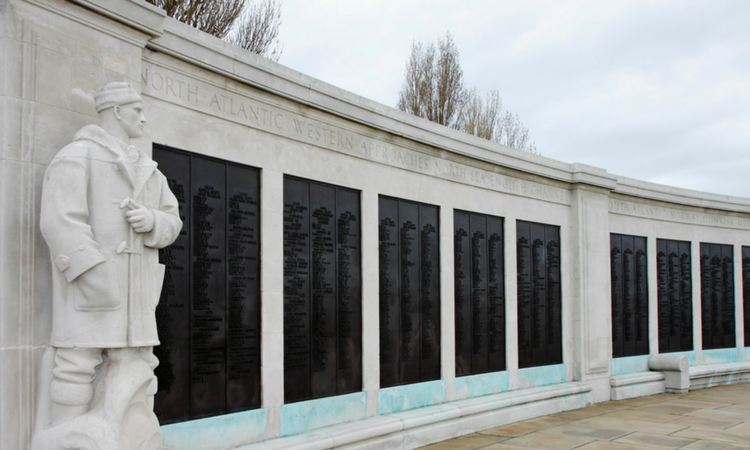27 February 2018
Poets of the Great War: Miles Jeffrey Game Day
Today, 27 February, marks 100 years since war poet Flight Commander Miles Jeffrey Game Day was killed in action flying over the North Sea.

Day is commemorated on the CWGC Chatham Naval Memorial in Kent
Military
Day joined the Royal Naval Air Service (RNAS), being commissioned in 1914 and rising to the rank of acting flight commander.
He was already an experienced pilot when he joined No. 13 Squadron RNAS, based at Dunkirk, in December 1917. He was awarded the Distinguished Service Cross for “great skill and bravery as a fighting pilot” for his actions during two attacks in January and February 1918. On 27 February, he was shot down over the sea about 25 miles west of Dunkirk by a German seaplane.
The account of his death by his commanding officer states:
"he was shot down by six German aircraft which he attacked single-handed, out to sea. He had out-distanced his flight, I think because he wished to break the [enemy's] formation, in order to make it easier for the less experienced people behind him to attack. He hit the enemy and they hit his machine, which burst into flames; but, not a bit flurried, he nose-dived, flattened out, and landed perfectly on the water. He climbed out of his machine and waved his fellow-pilots back to their base; being in aeroplanes [not sea-planes] they could not assist him."
His body was not found, and he is commemorated on the CWGC Chatham Naval Memorial in Kent.
Poetry
Day began writing poetry during his spare time, initially humorous verses for his fellow officers in the style of W. S. Gilbert, but later, inspired by Rupert Brooke's work, he began to compose longer, serious poems. Only three of these - On the Wings of the Morning, An Airman's Dream and part of To My Brother, were published in his lifetime.
To My Brother was written after the death of his older brother Dennis Ivor Day, who was serving as a Second Lieutenant in the Royal Field Artillery when he was shot by a sniper at Vermelles on 25 September 1915. He was taken back to the UK for medical treatment and died on 7 October.
Day's collected poems were published post-war, and two of his poems were included in anthologies.
To My Brother
At first, when unaccustomed to death’s sting,
I thought that, should you die, each sweetest thing,
each thing of any merit on this earth,
would perish also, beauty, love, and mirth:
and that the world, despoiled and God-forsaken,
its glories gone, its greater treasures taken,
would sink into a slough of apathy
and there remain into eternity,
a mournful-minded, soul-destroying place
wherein there would be seen no smiling face,
where all desire to love and live would cease,
and death would be the only way to peace.
And when one day the aching blow did fall
for many days I did not live at all,
but, dazed and halting, made my endless way
painfully though a tangled growth of grey
and clinging thorns, dismal, towards belief,
and uncontrollable, heart-racking grief.
It could not be! – that one so fair and strong,
so honest-minded, and so void of wrong,
that one who made such splendid use of life,
whose smile could soothe the bitterness of strife
and make a cold, hard nature warm and soft
(who used to smile so frankly and so oft)
should die, and leave our spirits numb and breaking,
grief-stifled, and yet empty, sick, and breaking...

